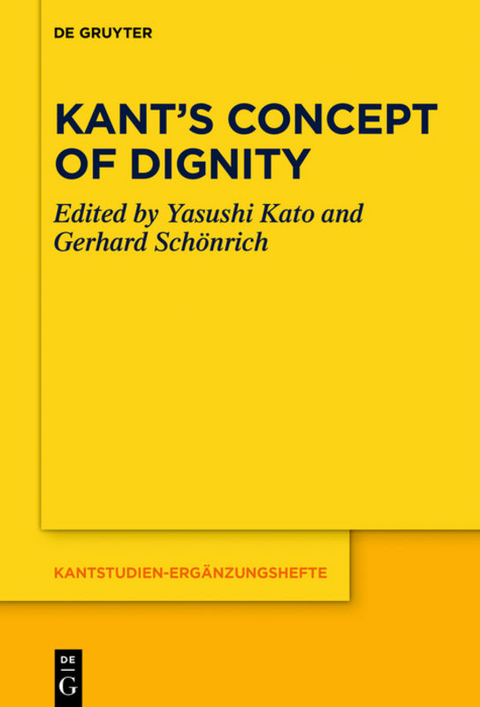Kant’s Concept of Dignity
Seiten
In der Reihe werden herausragende monographische Untersuchungen und Sammelbände zu allen Aspekten der Philosophie Kants veröffentlicht, ebenso zum systematischen Verhältnis seiner Philosophie zu anderen philosophischen Ansätzen in Geschichte und Gegenwart. Veröffentlicht werden Studien, die einen innovativen Charakter haben und ausdrückliche Desiderate der Forschung erfüllen. Die Publikationen repräsentieren den aktuellsten Stand der Forschung.
Nearly all philosophers refer to Kant when debating the concept of dignity, and many approve of Kant’s conception, unaware of the tensions between Kant’s conception and the modern idea of dignity intimately connected to the idea of human rights. What exactly is Kant's conception of dignity? Is there a connecting tie between dignity and the legal sphere of human rights at all? Does Kant’s concept refer to a superior status human beings seem to own in comparison to non-rational beings? Or does it refer to an absolute value? The contributions of this volume are organised in five broader topics. In the first section tensions within the Kantian conception of dignity are discussed (C. Horn, D. Birnbacher, G. Schönrich). The second group of articles illuminates the intimate connections between dignity and human rights (R. Mosayebi, M. Kettner). The third group discusses the prevailing moral conception of dignity (S. Yamatsuta, S. Shell, O. Sensen). The fourth group focuses on the relation of dignity and end in itself (T. Hill, D. Sturma, A. Wood). The central theme of the fifth group of contributions are the social, political, and cultural dimensions of dignity (Y. Kato, K. Ameriks, K. Flikschuh, T. Saito).
Nearly all philosophers refer to Kant when debating the concept of dignity, and many approve of Kant’s conception, unaware of the tensions between Kant’s conception and the modern idea of dignity intimately connected to the idea of human rights. What exactly is Kant's conception of dignity? Is there a connecting tie between dignity and the legal sphere of human rights at all? Does Kant’s concept refer to a superior status human beings seem to own in comparison to non-rational beings? Or does it refer to an absolute value? The contributions of this volume are organised in five broader topics. In the first section tensions within the Kantian conception of dignity are discussed (C. Horn, D. Birnbacher, G. Schönrich). The second group of articles illuminates the intimate connections between dignity and human rights (R. Mosayebi, M. Kettner). The third group discusses the prevailing moral conception of dignity (S. Yamatsuta, S. Shell, O. Sensen). The fourth group focuses on the relation of dignity and end in itself (T. Hill, D. Sturma, A. Wood). The central theme of the fifth group of contributions are the social, political, and cultural dimensions of dignity (Y. Kato, K. Ameriks, K. Flikschuh, T. Saito).
Yasushi Kato, Hitotsubashi-Universität, Tokio, Japan, Gerhard Schönrich, Technische Universität Dresden, Deutschland.
Yasushi Kato, Hitotsubashi University, Tokyo, Japan, Gerhard Schönrich, University of Technology Dresden, Germany.
| Erscheinungsdatum | 18.12.2019 |
|---|---|
| Reihe/Serie | Kantstudien-Ergänzungshefte ; 209 |
| Verlagsort | Berlin/Boston |
| Sprache | englisch; deutsch |
| Maße | 155 x 230 mm |
| Gewicht | 631 g |
| Themenwelt | Geisteswissenschaften ► Philosophie ► Philosophie der Neuzeit |
| Schlagworte | Autonomie • Autonomy • dignity • ethics • Ethik • Human Rights • Menschenrechte • Würde |
| ISBN-10 | 3-11-066120-9 / 3110661209 |
| ISBN-13 | 978-3-11-066120-0 / 9783110661200 |
| Zustand | Neuware |
| Haben Sie eine Frage zum Produkt? |
Mehr entdecken
aus dem Bereich
aus dem Bereich




